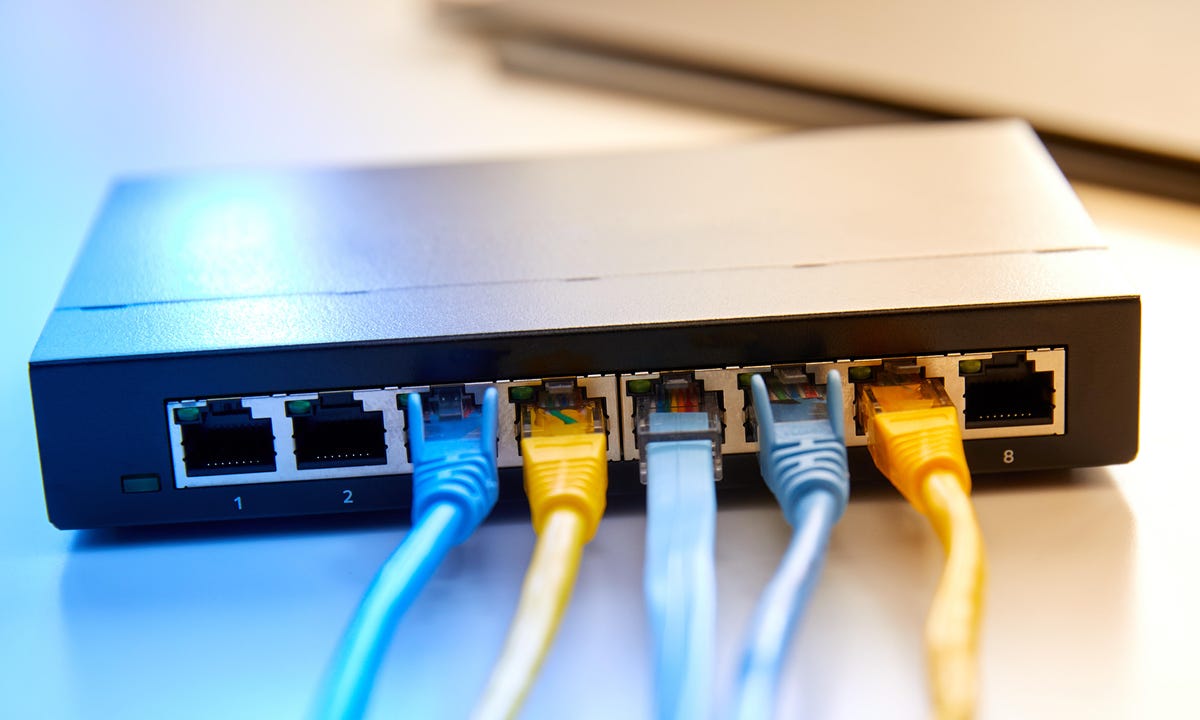 Why You Can Trust CNET
Why You Can Trust CNET
Our expert, award-winning staff selects the products we cover and rigorously researches and tests our top picks. If you buy through our links, we may get a commission. How we test ISPs
Before I joined CNET, all I cared about was my Wi-Fi. After I joined the broadband team and started writing about home internet every day, I realized I'd thrown the term Wi-Fi around but didn't really understand it. What is Wi-Fi exactly? And is it better than those ugly cables known as Ethernet?
The answer is subjective, depending on your specific internet needs and setup. Knowing what internet speeds you need and what you're actually getting is vital to creating an optimized home internet setup and finding the best broadband provider for your household.
So, after covering broadband for CNET for over nine months, I decided to test Ethernet and Wi-Fi connections at home for myself to what the real differences are and to determine which is better, faster, cheaper and safer.
The answers may surprise you.
Read more: Home Wi-Fi issues? Here are some simple steps to boost Your Wi-Fi
My home internet experiment
Wi-Fi is a way to wirelessly connect to the internet. Whether cooking in the kitchen or sitting on the couch, you can use a Wi-Fi connection to hop online without worrying about plugging into your modem or router. Ethernet is the opposite. It's a wired connection that requires either coaxial or fiber-optic cables plugged directly into your router, which can be inconvenient, but provides a more reliable, faster connection in some cases.
I tested this for myself using Speedtest by Ookla, CNET's pick for the best speed test, comparing my internet speed over Wi-Fi and Ethernet connections to see which was faster. You might be surprised at the difference; I certainly was.
Over Wi-Fi, I was receiving download speeds of around 126 megabits per second. With Ethernet, my download speed shot up to 395Mbps, which is only 5Mbps away from what I'm actually paying for monthly.
I never noticed much lag when streaming with Wi-Fi, but using an Ethernet cable made a noticeable difference. Movies, shows and live television loaded much faster on Hulu, HBO Max and Netflix. To maximize response time, I decided to plug my Ethernet cable into my PlayStation 5 indefinitely.
Then I wondered, why was Ethernet faster than my Wi-Fi connection?

This is what it looks like when you connect a device to a router using Wi-Fi.
Photo by Maskot/Getty ImagesWi-Fi stands for Wireless Fidelity, meaning it's a completely wireless network connection. After setting up a router, you can wirelessly connect your computer, mobile device and television to the internet.
Although the connection may be stronger the closer you are to the router, you should be able to access the internet wherever you are in your house. Know that some areas of the house may create Wi-Fi "dead zones," with lagging speeds despite what you may be paying for monthly. My CNET colleague, Trisha, discovered this by experimenting to boost her gigabit speeds at home.
It may also help to purchase a Wi-Fi extender that broadcasts signals to every room, resulting in fewer dead zones and a more reliable internet connection throughout the house. The TP-Link RE605X is CNET's top pick for the best Wi-Fi router due to its affordability, ability to support Wi-Fi 6 speeds and easy-to-use features.

Ethernet cables connected to a router.
Photo by Thanasis/Getty ImagesWhat is Ethernet?
Before there was Wi-Fi, there was Ethernet. Ethernet existed as the primary way to link devices together and connect to the internet, through cables that plug directly into your router.
A wired connection means you have to be near your equipment if you want to go online, but it is possible to wire your house with Ethernet cables, similar to cable wiring, though the procedure can be costly.
What is the future of Ethernet?
Over the past decade, Ethernet has undergone many changes, and even more so with the increase of artificial intelligence.
According to the Ethernet Alliance, due to the rise and demand of AI, Ethernet connection speeds are evolving and are projected to increase to 800 gigabits and beyond.
Comparing Wi-Fi and Ethernet
Wi-Fi and Ethernet have advantages and disadvantages depending on your personal needs. Here's what you need to know.
Wi-Fi
Pros
- Convenience
- Mobility
- Affordability
Cons
- Congestion
- Limited range
- Security risks
Ethernet
Pros
- Reliability
- Faster speeds
- Secure connections
Cons
- Limited mobility
- Limited number of connected devices
- Cost
Which is cheaper?
It might seem like the cost of Wi-Fi and Ethernet would be similar -- since you're paying for the service, not the mode of internet connection -- but Wi-Fi is actually significantly cheaper than Ethernet. This mostly comes down to installation costs and the complexity of setting your home or office up for a wired Ethernet connection. Wi-Fi can handle a lot more devices than regular Ethernet cables can. To make it worthwhile, you would have to install a switch box or Ethernet jacks around your house to connect multiple devices to the internet.
Which is faster?
Ethernet's main advantage is speed. Since your device is connected directly to the router -- compared to wirelessly through Wi-Fi -- you can expect faster bandwidth, which is how much data you can transmit through an internet connection.
Ethernet also boasts more consistent speeds since wired signals don't fluctuate as easily as wireless ones do. You also won't have to worry about latency issues or a lag in connection that sometimes occurs with local network congestion. Since lower latency improves online gaming, Ethernet provides a smoother experience for online gamers.
Which is safer?
One of Ethernet's advantages over Wi-Fi: the connection is safer and more secure. Hackers can more easily intercept data transmitted through Wi-Fi, but if they want to hack you over Ethernet, they need to physically connect to the router.
Which is better overall?
Using an Ethernet connection all the time is just not practical. Using Wi-Fi, you can access the internet from anywhere in your house without plugging into a router. Ethernet limits your mobility, which is unrealistic if you have several people connecting multiple devices.
Testing my internet speeds with an Ethernet cable did help me pinpoint the root cause of my slow connection. Based on the drastic difference between the Wi-Fi and Ethernet speed tests, I determined that my Wi-Fi connection was to blame for the slow service, not my ISP throttling my speed. By plugging Ethernet cables into my PlayStation 5, I can use faster speeds and lower latency for an optimized gaming experience.
I haven't taken any steps yet to boost my Wi-Fi signals, but I might move my router to a more central area of my apartment or get an extender to help my speeds stay consistent. My colleague Ry Crist dives into more ways to speed up your Wi-Fi, and you can bet I'll be taking his advice.
What's the bottom line?
Both Wi-Fi and Ethernet have their benefits when it comes to home broadband. Wi-Fi offers mobility and convenience, meaning you can access the internet anywhere in your home, while Ethernet provides faster and more secure connectivity.
Most of us will be better off with Wi-Fi because our homes and apartments are filled with smart devices. Ethernet is a great tool to increase responsiveness, especially for gamers who want less lag with online gaming.
Wi-Fi vs. Ethernet FAQs
Can I use both Wi-Fi and Ethernet?
Many households use Ethernet cables for certain devices, like gaming consoles or televisions, that are planted in one spot and need fast connectivity. Wi-Fi is the better option for mobile devices -- that way, you can take your phone or tablet anywhere without having to plug it in.
What are the different types of Ethernet cables?
Ethernet cables can be coaxial, a twisted pair or fiber optic. Seven different Ethernet cables are available on the market: CAT5, CAT5E, CAT6, CAT6A, CAT7, CAT7A and CAT8. Each differs in purpose, cost and the distance they cover, so do your research before purchasing one for your home.
How do I set up an Ethernet connection?
Setting up an Ethernet connection is a pretty straightforward process. Most cables require you to plug one end into the router and the other into your device. You can access the internet once you change your adapter settings to the Ethernet connection.